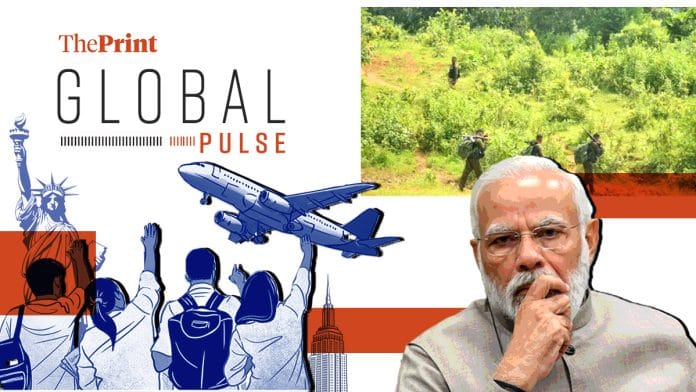New Delhi: This year has been the worst for Modi in his 11 years as Prime Minister, writes Veena Venugopal in India Business Briefing in the Financial Times. The Prime Minister is facing setbacks in both internal and external arenas, and Trump’s punitive tariffs, a “wobbly” economy, and the “Gen-Z protests” in Ladakh are further weighing him down, writes the newsletter editor of the FT.
“The most marked change, though, is in Modi’s popularity online. While he used to always command ringing support on social media, no matter the issue, that is less visible these days. Yesterday, the prime minister posted on social media after the Indian cricket team beat Pakistan in the Asia Cup final, calling it ‘Operation Sindoor on the games field’,” says the Financial Times, referring to Modi’s latest bout of criticism. “The replies were full of ordinary citizens chiding him for comparing a game to a military operation, which followed a terror attack in which Indian lives were lost.”
Venugopal writes that the “immediate impact of this annus horribilis” will be visible in the Bihar elections, due to be held later this year.
“The current crises are forcing a rethink on all aspects of the government. How the country emerges from this will determine what its political future will look like,” reads the newsletter.
Like other major foreign publications in recent days, The Wall Street Journal zooms in on students and aspirants left in the lurch, following US President Donald Trump’s USD 100,000 H1-B application fee.
“Now that the Trump administration has announced a $100,000 fee for new H-1B applications, her future is in doubt,” says the WSJ, referring to Manisha Puppala, “who took on $120,000 in loans to study in America and has been working at a Boston firm on a permit that allows foreign students to work temporarily in the US.” Puppala had dreams of running her own start-up.
“…another H-1B worker based in Boston, said the news has highlighted how vulnerable his position is in the U.S.—‘Is this country truly home for me?’ he said he is asking himself. ‘Or is it time to go back to the country that, no matter what, will always be?’” reads the report, which highlights this newfound precarity.
This situation comes when qualified Indians, as the report says, have struggled to find jobs back home.
“Compared with the US, Indian work culture remains much more hierarchical, some tech professionals say. Artificial intelligence could also threaten many entry-level opportunities,” says the report.
The Indian government’s violent crackdown on Maoists is leaving the movement rudderless. And activists are questioning the human cost of such activities, as reported by the BBC correspondents, Vishnukant Tiwari, Jugal Purohit, and Antariksh Jain, in the BBC, while delving into the atrocities committed by the state during its attempts to curb guerrilla fighting.
“In Chhattisgarh’s Bastar district, Pekaram Mettami mourns his son Suresh, in his 20s, killed by Maoist rebels in January over alleged police links—a claim denied by his family, police, and locals,” says the report. “Suresh, who studied up to 10th grade, was the village’s most educated resident and a strong advocate for local schools and hospitals.”
“He only wanted better facilities for his people and that cost him his life,” his father has been quoted as saying.
“Locals allege that such security operations—where the line between armed rebels and ordinary civilians is often blurred—are common,” notes the BBC.
The district reserve guard, which carries out the operations, includes “locals and surrendered Maoists”. “Rights activists oppose including locals in these units, likening them to the now-dissolved Special Police Officers (SPO) force, which also relied on local recruits,” the BBC points out. It adds that in 2011, the Supreme Court ordered Chattisgarh to disband the force, while “calling it unconstitutional”, along with a “warning that tribal recruits were undertrained and used as cannon fodder against rebels”.
(Edited by Madhurita Goswami)
Also Read: Forces dealt a big blow to Maoist top rung with Chalapathi killing. But many big guns still at large







An article in FT from a half Indian author and you call it global media?! That article was published yesterday and your article too was published yesterday. Hand in glove?